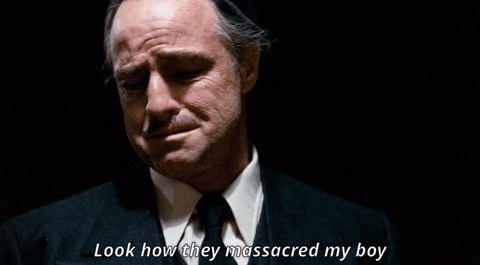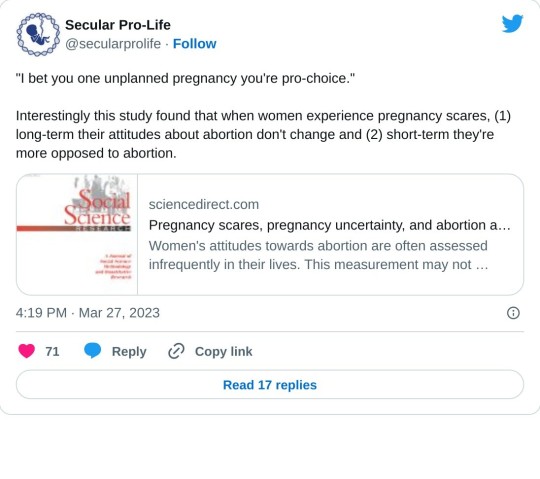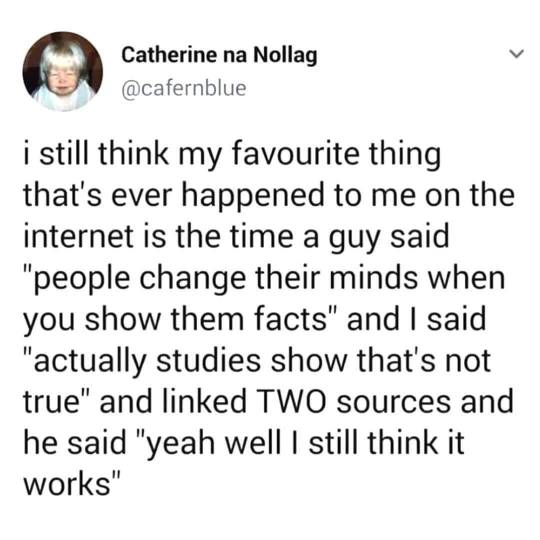#Scientific Studies
Explore tagged Tumblr posts
Text
me: peer review is an essential part of the scientific process and helps maintain trust in and integrity of the research we publish
also me, the second anyone suggests an edit to my work:

#a niche issue im aware lol#but still#sometimes theyre right#sometimes their ideas are garbage#but bitches crave that publication sooo#academia#research#science#scienceblr#peer review#peer reviewed#studies#scientific studies#publication#medicine#public health#biology#niche problems#meme#look at how they massacred my boy
284 notes
·
View notes
Text
Is there a magazine or something similar that shares cool and quirky scientific studies? Like the kind of studies that do numbers on tumblr? Tagging some of the sciences that might have such studies.
Basically I really miss Mental Floss magazine and I want a similar, physical magazine subscription.
13 notes
·
View notes
Text

#abortion#pregnancy scare#prolife#pro life#pro-life#anti abortion#studies#scientific studies#twitter#secular prolife
122 notes
·
View notes
Text
Currently writing my concerns about the objectum discourse in the OSC from yesterday. I have a few things to say about it.
Before I post it, here's some educational material I think the OSC needs to look through to understand what exactly Objectum and Objectum sexuality is. CW, the following links discuss (sometimes intimate) sexual attraction. The studies linked here also may need the Unpaywall addon to be read.
#objectum#objectosexual#objectosexuality#objectum sexuality#osc#object show community#neurodivergant people are not a threat to you#predators can be anywhere regardless of attraction; learn to call them out without harming neurodivergent people#words can't describe how disappointed I am over this thing Jesus Christ#it's fine to feel uncomfortable with things you don't understand#but to label an entire group of neurodivergent people with an unique harmless attraction as monsters is highly dangerous and ableist#stop with that shit please#scientific studies#studies on objectum
3 notes
·
View notes
Text
[Taking notes.]
should be able to leave kudos on scientific studies. i liked your paper dude keep at it
107K notes
·
View notes
Text
every time i hear about a study done on rats its the most wildest thing ever heard of
0 notes
Text
Do Cleanses and Detoxes Work? Scientific Insights and Real-Life Stories
Embarking on a journey towards better health often leads many to consider cleanses and detoxes. The idea of purging toxins from our bodies is alluring, promising a fresh start and improved well-being. Let’s delve into this topic: Do Cleanses and Detoxes Work? Scientific Insights and Real-Life Stories and expert insights to uncover the truth behind these popular health regimens. Do Cleanses and…
#Balanced diet#Cleanses#Detox Teas#Detoxes#Detoxification#Exercise and Detox#Gut health#Health and wellness#Healthy living#Intermittent Fasting#Juice Cleanses#Kidney Health#Liver Function#Natural Detox#Nutrition#Personalized Health Guidance#Professional Health Advice#Real-Life Stories#Scientific Studies
0 notes
Text
DOOMED BY PROGRESS: A SCIENCE FICTION SHORT STORY, PART II
DOOMED BY PROGRESS Due to technical difficulties, I will need to postpone my posting of The Ultimate Experiment. So for now, I will begin posting my short story, Doomed by progress. This is an unpublished story. The United States had decided to turn back to coal for the main source of power, primarily based on politics. Also decided was to relax pollution standards also the product of a weak…
View On WordPress
0 notes
Text
Help! It's too noisy to learn
When an airport moves, the children who've been living with that extra background noise at home can improve in long-term memory, short-term memory, and reading performance! Learn why in my latest post about #memory #learning #reading and #teaching
We’ve known for a long time that some learners need a certain type of noise or quiet in order to learn. For example, auditory learners will learn best by listening or by having noise in the background while they’re trying to learn something. And learners with sensory-avoidant sensitivity often need quiet to learn – like an ADHD or autistic student needing to wear noise-cancelling headphones in…

View On WordPress
#ADHD#airports#autism#background noise#headphones#learning#long-term memory#memory#noise#noise-cancelling headphones#school#scientific studies#sensory issues#short-term memory#students#teaching
0 notes
Text
I'm not exactly sure what you're talking about, but let me explain what I'm talking about!
This article focuses primarily on the boomerang effect, that is, the idea that telling people a fact will somehow make them believe the opposite. It says so right at the start:

This idea is what the article ultimately presents a case against. The whole thing about changing someone's belief is secondary at best, and the article doesn't seem to come to a clear conclusion about it (because that's not the main topic):

(you can see that in both of these quotes, it even says straight up that people tend to cling to their beliefs, although it's not supported by a source - probably because the article is not really about that, like I said.)
The main study they refer to throughout the article is Skurnik, Yoon, and Schwartz, which is all about a flyer about facts and myths backfiring:

You can see that this is not actually about the students' pre-existing beliefs, but rather about telling them facts and seeing if doing so will somehow be worse than not saying anything. The vast majority of the text is talking about how this study was being repeated and the results came out different.
So what does it actually say about changing one's beliefs?
One study is mentioned at the very beginning, but I couldn't find any references to it being refuted:

Other than that, the closest we get to talking about pre-existing beliefs is this study:

You can see that there's not a whole lot of info here. We don't know what the false statements were, but the example given in the article is non-political and more about general knowledge. The average strength of belief seems to be 6 out of 10, which is kinda middlish. So what this seems to show is that if corrected about a topic you don't feel very strongly about, by someone who has authority over you, you'll be likely to at least temporarily accept the new info. Which, great, but this only covers a small amount of scenarios where someone is presented with information that's contrary to their belief.
So the article mentions another study about people (not) changing their opinion:

(See how the focus is on doubling down, aka the boomerang effect? That's because it's what the article is about.)
So there was a repeat of this study with updated methodology,* and:

So no boomerang effect was shown, but people also didn't seem to change their minds. (Based on both the wording in the article and the actual paper - looking at the graphs, I'm not really seeing a flip from 'this statement is 100% true' to 'this statement is 100% false'.)
I could go on, but I hope it's now clear what I meant - this article primarily refutes the boomerang effect, and doesn't prove very well that people change their minds when confronted with facts. (They might be slightly less convinced though, but this is not enough to say 'those sources were wrong'.)
_____
*They used MTurk, and only MTurk, to get data from more than 10k people. MTurk data is generally considered to be pure trash, but if you don't believe me, here's a pretty persuasive paper about how unreliable studies using this tool can be, but this is a whole different topic.

#what I said about pissing on the poor etc.#science#scientific studies#remember kids: just because a scientist says it doesn't mean it's true#and just because it's a published study doesn't mean it's a good one#personally I do believe that people can change their minds when presented with facts#but then again you have people like my aunt who is so far in denial she's about to become a citizen of Egypt
12K notes
·
View notes
Text
0 notes
Text
States with higher narcissism had lower obesity and depression rates, and a lower likelihood of heart failure and hypertension deaths. However, these states reported less sleep and higher demand for plastic surgeons.
0 notes
Text
Unraveling the Cholesterol Enigma: Navigating the 42% Higher Dementia Risk
Cholesterol, the often-misunderstood compound in our bodies, has been a topic of debate for decades. Recent studies have revealed a surprising connection – a 42 percent higher dementia risk linked to what we commonly refer to as ‘good cholesterol.’ In this article, we will unravel the complexities, explore the science behind the statistics, and understand what this means for our overall…

View On WordPress
#brain health#cholesterol#Cholesterol Management#Cognitive Health#Dementia Risk#Good Cholesterol#Health Myths#Lifestyle Choices#Medical Research#Scientific Studies
0 notes
Text
eh, it's from the University of Arizona; I wouldn't trust it without further confirmation.
"Men should put the seat down when they're done peeing so that I don't fall into the toilet when I sit down to pee"
"Actually women should be putting the seat back up when they're done peeing as a courtesy so that I don't have to touch it and put the seat up before I pee"
Actually, both the seat AND lid should be down when no one is actively using the toilet, because this prevents things from accidentally falling into / accidentally being dropped into the toilet. Also having the lid down when you're flushing is important because it prevents the toilet from spraying out bacteria.
#dailymanners#meret118#Toilets#Toilet Etiquette#Hygiene#University of Arizona#Scientific Studies#informative reblogs#reblog replies#Our Staff#zA Opinions
15K notes
·
View notes
Text
Stress, MS, and a Little Bit of Mindfulness
New research is out on the relationship of stress to MS progression and disability. In this entry, I break down my thoughts about why this is important and how to take action to break the cycle.
It’s no secret that stress can have a negative impact on many aspects of someone’s health, both mental and physical. But with an autoimmune condition like multiple sclerosis, the effects can have an even more lasting impact. Because stress can trigger disease activity — an MS relapse — it can lead to disability or faster progression of the disease, something I know I certainly don’t want to put…

View On WordPress
0 notes
